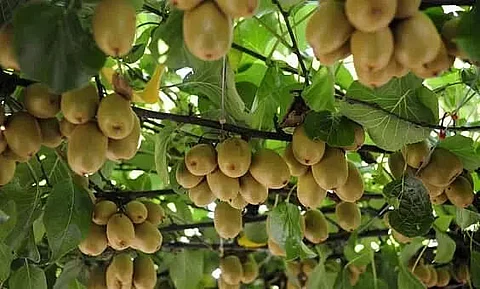
- Home
- Live Blog
- Breaking News
- Top Headlines
- Cities
- NE News
- Sentinel Media
- Sports
- Education
- Jobs

Representational image
North East possesses rich resources of soil and agro-climate making it an ideal region for temperate fruits and spice cultivation. Fruits namely apple, pear, plum, peach are grown semi commercially in the NE-Hill states particularly in Arunachal Pradesh, Sikkim, Nagaland, and Meghalaya.
Notably, nowadays Kiwi fruit, walnut, and strawberry cultivation are also extended to new areas with advanced farming techniques.
The Kiwi fruit is a berry, oblong-shaped with brown skin. The fruit has a delicate, refreshing flavour, sweet aroma, and high nutritional and medicinal values. The centre of origin of Kiwifruit lies in China and hence is grown as Chinese gooseberry.
Kiwi has caught the imagination of producers in Arunachal Pradesh, where not only productivity is good, but also the quality of the product is reported to compare favourably with Australian kiwi fruits that are in good or in Thrust Areas in Apple Production demand in the international market.
Although the Kiwifruit is of recent introduction in the state it has assumed tremendous popularity and preference among the growers as well as consumers due to its favourable properties for easy maintenance and marketing besides having high nutritional and medicinal values. The Kiwifruit of the state has already attained commercial identity not only in the local markets but also in the national as well as international markets. The organic certification to the Kiwi fruit grown from Arunachal Pradesh's Ziro Valley was given in the month of October 2020 by the Mission Organic Value Chain Development for the North-East. Today, the kiwis of this region are the only certified organic fruit of their kind in the country. According to Okit Palling, Chief Executive Officer, Arunachal Pradesh Agriculture Marketing Board, the state accounts for 50 per cent of the country's kiwi production.
Over the last decade, the Kiwi fruit production in Arunachal Pradesh has made big strides resulting in the state accounting for as much as 50 per cent of the total production of the rare fruit in the country. The classification of the Arunachal's wild Kiwi as the nation's only certified organically produced fruit recently has the potential to give further impetus to its production in the state.
Union Agriculture Minister Narendra Singh Tomar said that Nagaland should be made ''Kiwi State of India" by making persistent efforts in research and training farmers to reap good returns from Kiwi production. Tomar informed that in a bid to reduce the country's dependence on imports and to stay in line with the call of ''Vocal for Local", his ministry is trying its best to provide handholding support to Kiwi farmers across the country. The Union Minister Narendra Singh Tomar also said that the Centre is working closely with the state government and especially the Central Institute of Horticulture, Nagaland, in capacity building of farmers in production as well as the packaging of kiwi products. This is being done as the Centre understands problems faced by farmers in the northeastern region in getting good planting material, productivity issues, lack of packaging facilities, and marketing networks for farmers, he added.
Large cardamom also referred to as 'Queen of Spices' is a kind of perennial spice belonging to the family Zingiberaceae. The crop grows in abundance in the Anjaw district of Arunachal Pradesh. Large cardamom in Arunachal Pradesh grows in huge quantity because of semi-evergreen forests and humid subtropical climate. It is also widely grown in Upper Siang, East Siang, Upper Subansiri, Lower Subansiri, and other mountainous parts of Arunachal Pradesh.
Agriculture and Horticulture minister Tage Taki in the previous year said that Arunachal Pradesh is all set to double the production of large cardamom in the next 5-6 years.
"Arunachal has been taking several steps to streamline the production of spices such as large cardamom, turmeric, ginger, and chillies. Last year, we managed to export 5,020 MT spices valued at Rs 24.89 crore. In the next 5-6 years, we aim to double the production of large cardamom," Taki who was addressing a global webinar on the topic "Local to Global – Spices of India,".